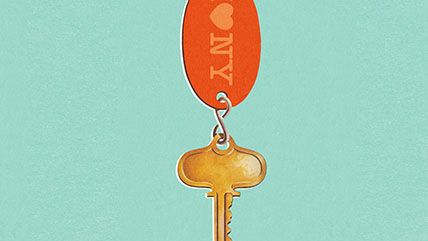Airbnb: Public Enemy No. 1?
Many people don't seem to be taking it all that seriously.

New York passed one of the nation's most onerous anti-homesharing laws last year, but residents don't seem to be taking it all that seriously.
There were more than 55,000 Airbnb rentals in the Big Apple on the final night of 2016, the San Francisco–based homesharing service reports, up from about 47,000 on December 31, 2015. That made New York City the world's top Airbnb destination on New Year's Eve, despite the state law that prohibits the advertising of short-term rentals and the threat of $7,500 fines.
It was a fitting end to 2016, a year that saw more people than ever before using homesharing applications such as Airbnb and HomeAway, even as many states and cities cracked down on the practice.
Other cities have been less straightforward about it. In Chicago, short-term rentals are technically legal, but only if homeowners agree to let city inspectors search their property without warrant, for any reason, at any time. Beyond that, the homesharing ordinance passed by the Chicago City Council is so complicated as to be "literally incomprehensible," according to a lawsuit launched by some residents of the Windy City.
Efforts to restrict homesharing are often premised on the idea that government action is necessary to prevent unscrupulous landlords and careless renters from degrading neighborhoods. But that's an argument for enforcing existing anti-nuisance laws, not a reason to create new restrictions on what otherwise law-abiding residents can do with their own property. If renters—either the traditional sort or those using online platforms—are destroying property or threatening neighbors, they should be held accountable. Blanket bans on short-term rentals punish everyone in pursuit of stopping a few bad actors.
Enforcing short-term rental bans also takes police resources away from other, more important duties. Cops in Nashville, Tennessee, refused to enforce an Airbnb ordinance, saying they preferred to focus on stopping actual crime. State judges later ruled the regulation unconstitutional.
New York's ban on homesharing survived a legal challenge last year, but Chicago might not be so lucky. The city is facing a pair of lawsuits, with court dates set for later this spring.
Legislators in Florida, Indiana, Texas, and other states are now crafting laws to prohibit short-term rental bans. That poses something of a dilemma for skeptics of the use of state power to usurp local government. States should be prudent when interfering in how municipal bodies conduct business, of course, but federalism is no guarantee of liberty.
Political fights over homesharing will continue, but the best check against abusive government rules against homesharing might be to do what lots of New Yorkers did on New Year's Eve: Ignore them.
This article originally appeared in print under the headline "Airbnb: Public Enemy No. 1?."


Show Comments (31)